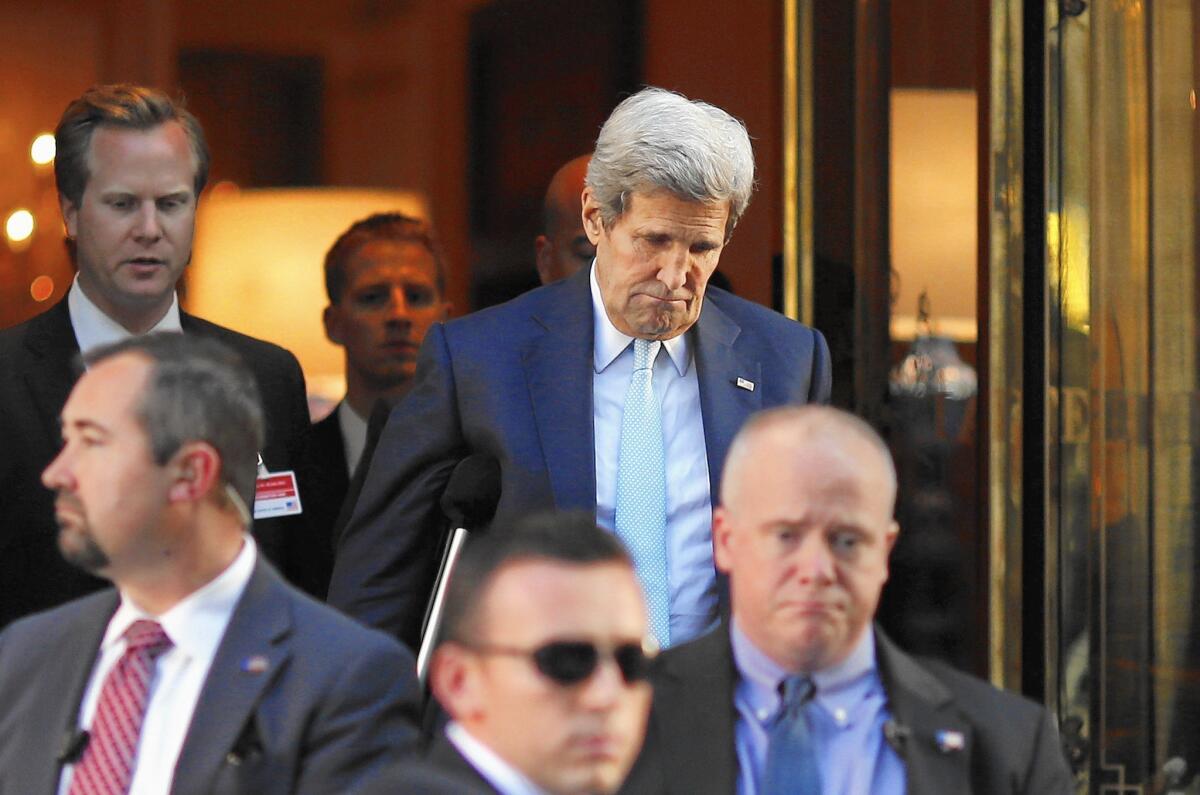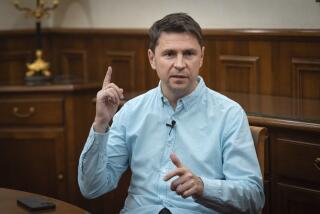Critics of Iran nuclear talks see room for a tougher bargain

U.S. Secretary of State John F. Kerry, rear right, leaves his hotel for a meeting with Iranian Foreign Minister Mohammad Javad Zarif in Vienna.
Reporting from VIENNA — The Obama administration began its nuclear negotiations with Iran by insisting that Tehran halt production of all nuclear fuel, dismantle its nuclear infrastructure and roll back its missile program. In two years of bargaining, each of those demands has been dropped.
As the administration and its five major-power negotiating partners close in on a comprehensive nuclear deal with Iran — indications are that one could be announced as early as Tuesday, although some issues remain unresolved — they will have to answer a tough question: Did they drive a hard enough bargain?
President Obama and his top advisors contend the deal will achieve several major U.S. goals. Most important, they say, it will prevent Iran from getting a nuclear bomb for 10 to 15 years, and maybe longer — a big victory considering that Tehran has been on the threshold of being able to build a nuclear weapon.
But critics, including some of Obama’s former advisors, argue that the group could have gotten a tougher, longer-lasting deal, considering that they began negotiations two years ago, after they had put in place a powerful set of sanctions to squeeze the economically fragile, militarily weak, medium-sized country.
Secretary of State John F. Kerry and his team are “letting this deal erode away as they try to close it,” Sen. Bob Corker (R-Tenn.), chairman of the Senate Foreign Relations Committee and sometimes an administration ally on Iran, said last month.
Administration officials counter that critics’ demands for a better deal are unrealistic, given the advances that Iran has made over the last 20 years, its ideological commitment to resisting U.S. pressure, and its status as a sovereign state that has rights under international treaties.
The kind of deal critics are demanding is a “unicorn agreement,” one that doesn’t exist in the real world, Colin Kahl, national security advisor to Vice President Joe Biden, said recently.
On Sunday, as foreign ministers prepared to arrive in the Austrian capital for what seems likely to be the final days of talks, Kerry insisted that the administration was holding firm on its current demands.
U.S. negotiators would not “shave at the margins to get an agreement,” Kerry said. Iran needs to compromise, he said in comments outside the hotel where the talks are underway, because “we are not yet where we need to be on several of the most difficult issues.”
Negotiations could still “go either way despite recent progress,” Kerry said, adding that President Obama is “prepared to walk” away from the talks if Iran does not agree to acceptable terms.
The debate about whether the final terms were acceptable will intensify in the days ahead if a final deal is reached, as the Obama administration mobilizes to win support. Both the administration and its critics see public opinion as key. Congress could vote to disapprove a deal, but Obama would veto any such resolution. The real test for an agreement, both sides believe, is whether it wins enough public acceptance to survive under the next president.
In one hint of the challenge, five former members of the administration’s Iran team said in a letter last month that they wished the deal could have been stronger. The five didn’t say they would oppose the emerging deal, but would not commit to supporting it until they see its final terms.
The United States and five other world powers — France, Britain, Germany, Russia and China — are seeking a deal with Tehran that would ease sanctions in exchange for Iran’s acceptance of restrictions intended to prevent it from obtaining a nuclear bomb.
The debate has at times taken a personal tone: Critics argue that the Obama administration is too eager for an agreement that could give the president a legacy-burnishing foreign-policy victory and possibly cap Kerry’s career with a Nobel Peace Prize.
Opponents of the deal say it will give Iran a huge economic boost as sanctions are eased and its government reclaims up to $150 billion frozen in overseas accounts. A deal will restore Iran’s ties to the world economy and give the former pariah state a new legitimacy, even as its military and proxy forces have been gaining influence in Yemen, Iraq, Syria, Lebanon and elsewhere in the region, the critics note.
Defenders of the negotiations say that Iran has also given up several major demands. The Iranians at one point insisted on a deal that would last no more than seven years and that would allow them to greatly increase the amount of commercial-grade nuclear fuel they could produce. The Iranians also vowed that they would never send their existing stockpile of nuclear fuel out of the country, which they are now poised to do, and that they would not allow international inspectors access to their nuclear sites.
Moreover, the Obama administration’s defenders note, both the George W. Bush and Clinton administrations also backed off a series of “red line” demands on Iran, as its nuclear program advanced, beginning in the 1990s.
The U.S. and allies jettisoned eight such “red lines” between 1995 and 2013, the Belfer Center for Science and International Affairs at Harvard’s Kennedy School pointed out in a paper. Those included demands that Iran never acquire even a civilian nuclear power facility; enrich uranium above a low grade; accumulate enough low-enriched uranium to fuel a single bomb; or build secret nuclear facilities.
A key disagreement involves the deal’s provision for international inspections.
Critics of the Obama administration say that because of Iran’s history of lying about secret nuclear facilities, the world powers should have the right to conduct “anytime, anywhere” inspections, a concession the George H.W. Bush administration won from Iraq after the 1991 Persian Gulf War.
But that agreement came only after a military surrender, said Jofi Joseph, a former nonproliferation official in the Obama White House.
“What is forgotten is that Iraq was militarily defeated in a humiliating rout and had little choice but to accept such terms,” he said.
Iran would never agree to any deal without three elements of the pending agreement, Joseph said: recognition of Iran’s right to produce some amount of nuclear fuel, a lifting of the sanctions, and a time limit on the deal, after which Iran would be treated like any other signatory to the Nuclear Nonproliferation Treaty.
The current deal “stacks up pretty well” compared with other recent nonproliferation agreements, said Mark Fitzpatrick, a former State Department official now with the International Institute for Strategic Studies in London.
The Clinton administration got North Korea to freeze its plutonium program, but without strict verification requirements, he noted. President George W. Bush gave up nuclear trade restrictions on India without gaining much in the way of nonproliferation safeguards, Fitzpatrick said.
Negotiation with Iran is a special challenge because it has a proud, ideological government and a leader, Ayatollah Ali Khamenei, who believes his country can get by without a deal, said Cliff Kupchan, an Iran specialist and chairman of the Eurasia Group risk-assessment consulting firm.
In general, it is tough to bend other countries, including allies, to the American will, Kupchan said.
This agreement can’t be fully judged until the details are clear about access to Iran’s military sites and until it is known how the United Nations’ nuclear watchdog agency has resolved its long dispute with Iran over suspected past research into nuclear weapons, Kupchan said. The IAEA investigation is aimed at finding out how much Iran knows about nuclear weapons, to make it easier to monitor its future activities.
He predicted that the agreement “will be good, not great.”
“Great agreements don’t happen,” he said.
More to Read
Sign up for Essential California
The most important California stories and recommendations in your inbox every morning.
You may occasionally receive promotional content from the Los Angeles Times.











